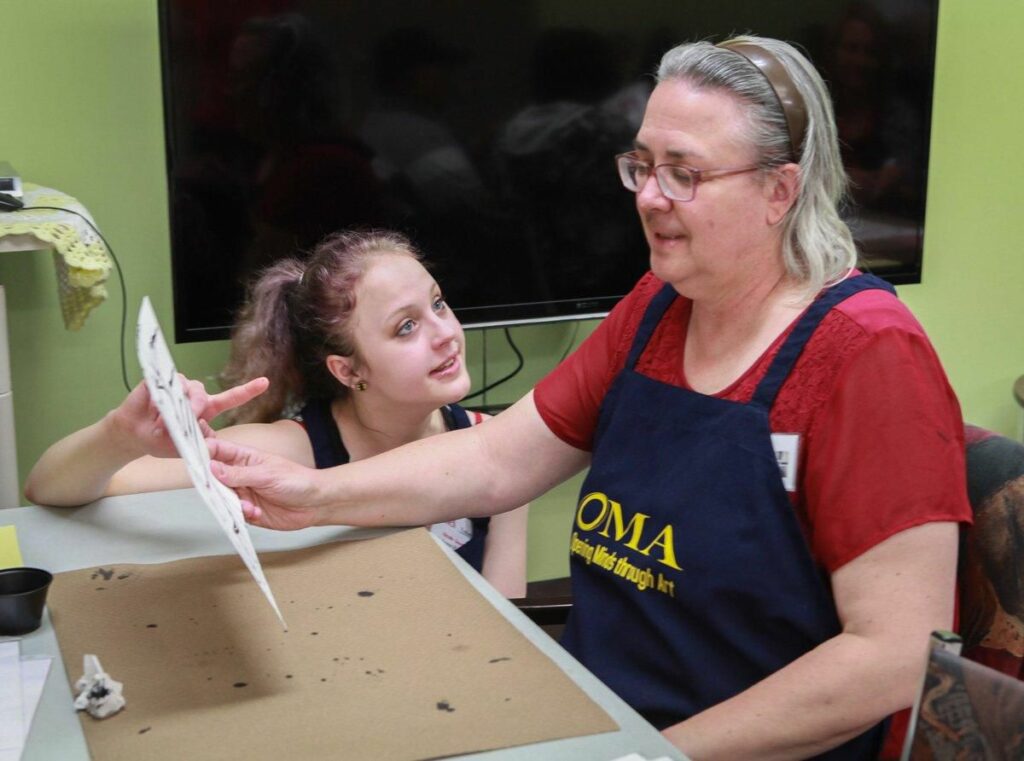Student Perspectives: Online Learning with OMA
When classes shifted to online learning due to the COVID-19 pandemic, OMA was no different. Some of our students wrote about their experience completing a service-learning course remotely. Below are two students’ reflections on this transition and their hopes for the future.
By Elias
OMA is inherently the opposite of social-distancing. The entire premise of the program is to connect with those who may not get visitors and do not have sufficient contact with the outside world. Going to the center and working on art with the artists is what volunteers go through training for and what residents look forward to all week. When that changed at the start of the COVID-19 pandemic, the program’s short term future seemed to be in jeopardy. The things the volunteers could do from home seemed limited, at least when the stay-at-home orders first began.
This did not remain the case for long, however. As the semester progressed virtually, we chose online projects to complete. I have to admit, I was skeptical at the beginning. I thought, “how much can we really get out of some online modules for stuff we’ve probably done?” I, however, misjudged the power of virtual lessons greatly.
Of course, there was purely informational learning that came out of the virtual lessons. With OMA though, the learning went far beyond facts and figures from textbooks. I found myself learning strategies to be a better volunteer, leader, and person throughout the modules and still somehow found a way to connect with others.

“With OMA though, the learning went far beyond facts and figures from textbooks. I found myself learning strategies to be a better volunteer, leader, and person throughout the modules and still somehow found a way to connect with others.”
As a part of “Corona Class,” I did an assignment where I interviewed my grandmother. She’s now 91 years old, and she doesn’t often speak much of her childhood and other family members. I talked to her (over the phone as to not make her sick) for longer than she almost ever wants to talk on the phone, and she told me some amazing stories. I never knew that she met my grandfather on a blind date. I talk to my grandmother all the time, but the OMA program encourage conversations I didn’t think about.
This was one experience of many I had during online OMA. I think my experience, and the experiences of many other volunteers, shows the power this kind of work can have regardless of where we are participating. These difficult and different times during online learning have proven challenging, but by reminding ourselves of the things that truly matter and what we can do from our homes around the country, we can all make it through these times and come out stronger on the other side.



By Erin
As a graduating senior at Miami University, I did not expect this turn of events in my final semester. We went from attending daily classes, meeting up with friends, and group studying to complete isolation. In the midst of social distancing, life continues with remote learning, more assignments and constant face-to-face interaction with loved ones. I don’t think any graduating senior thought this type of experience would occur this early in our careers. Thankfully, I will be continuing my graduate studies at Miami University. But, for my other colleagues, our experiences in OMA and continued learning are the connections that will be remembered from this time.
OMA was introduced to me the Fall of my junior year. I did not realize the impact this program would have on my life and future career. I used to be scared to interact with older adults, but now I am most certain I will enjoy the connections I can make as a future Speech-Language Pathologist. I volunteered for two semesters at two of Miami University’s OMA locations. With my OMA partners, I learned some critical skills to apply in my daily life. I learned the importance of flexibility when it comes to work with adults diagnosed with dementia. We have to be willing to adapt to the needs of others, even artistically, to form better life-long connections. I also learned the importance of patience. Art making can take a range of time, but the purpose is to form a bond in OMA. I enjoyed my time as a volunteer so much that I applied to be a leader for my senior year. Although my second semester experiences were cut short, I was able to continue strengthen my leadership skills and relationships with everyone involved.

“I learned the importance of flexibility when it comes to working with adults diagnosed with dementia. We have to be willing to adapt to the needs of others, even artistically, to form better life-long connections.”
In my remote learning experiences, OMA provided us with several opportunities to continue developing art and caregiving skills for people living with dementia. I have connected with the class through check-in meetings on WebEx. Some of the activities I have enjoyed the most in my remote learning have included creating OMA projects, participating in TimeSlips training, and discussing my own creativity.
I created the idea of a Sensory Box to implement at a Memory Café and developed the idea for “Handprint Trees” that could be a future OMA project. I was able to learn more about TimeSlips, a storytelling program. This skill can be helpful when interacting with loved ones of any age.
I am excited for the day we can all return to Miami University, especially face-to-face communication with others. OMA has played an important role in my undergraduate career and will continue to impact my future interactions. I will be sure to keep up to date with the development of this program and the people I’ve met. Stay strong Miami, continue being creative, and make sure to find a moment each day to test your creativity.


